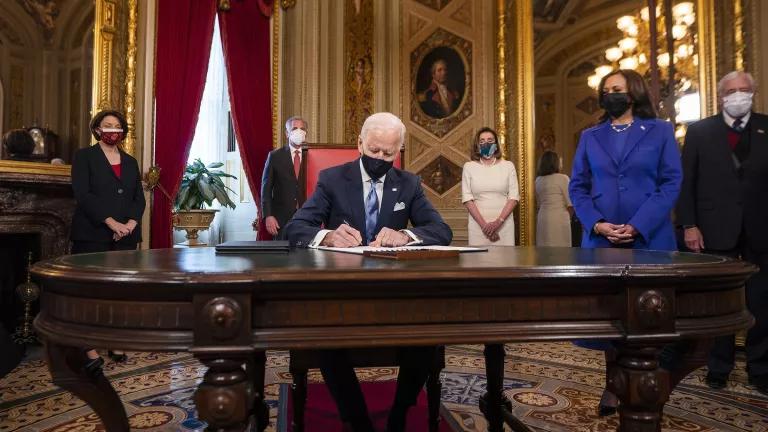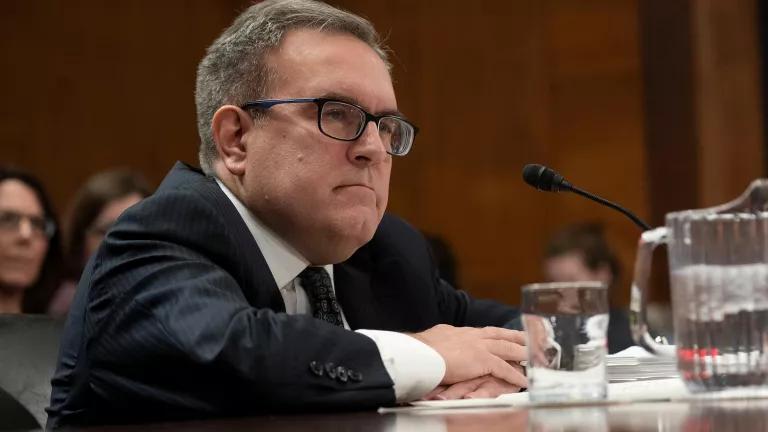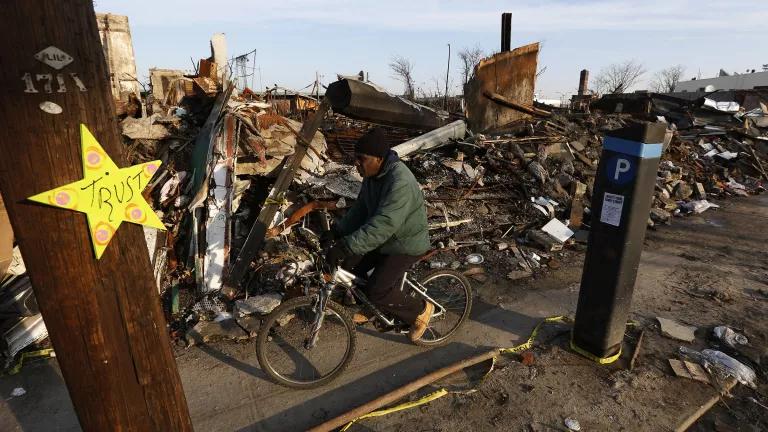The Real Lowdown: The Trump and Congressional Republican Assault on Our Environment, Vol. 28

A blow to America’s best tool for curbing climate-wrecking carbon pollution; Congress moves to whittle down our monuments to nothing; and the Trump administration is anti–clean cars.
Nine-plus months into his chaotic, careening, and crazed presidency, Donald J. Trump this week launched perhaps his biggest assault yet on Americans’ health and our environment.
Scott Pruitt, chief of the U.S. Environmental Protection Agency and Trump’s lieutenant in charge of rolling back a whole host of air, land, and water safeguards, signed a proposed rule on October 10 to repeal the Clean Power Plan. Trump wants to toss out America’s best tool for curbing power plant carbon pollution, a key driver of climate change.
“No way,” said an outraged Rhea Suh, president of NRDC, who noted that seas are already rising, and storms, floods, and wildfires are raging. “And it all gets worse if we let Trump walk away from the chance to clean up our dirty power plants, create half a million good-paying clean energy jobs, and protect our children and communities from the growing dangers of climate change.”
According to Suh, “Making those improvements [under the Clean Power Plan] can create another 560,000 good-paying clean energy jobs, while cutting our families’ electricity bills about $7 a month by 2030. In addition, the plan delivers nearly $7 in public health and climate benefits for every $1 invested in efficiency and clean energy.”
When fully in place by 2030, the Clean Power Plan would reduce carbon pollution 32 percent below 2005 levels while boosting the rapidly accelerating transition to clean energy. It would also deliver enormous health benefits—helping avoid 90,000 asthma attacks in children, 300,000 missed school and work days, 1,700 heart attacks, and up to 3,600 premature deaths.
“We had a Clean Power Plan. Now what we’re getting is a dirty power plan,” said David Doniger, director of NRDC’s Climate & Clean Air program, who wrote a critical analysis of the proposed repeal showing the long road ahead for Pruitt & Co.
In justifying the repeal, Trump’s EPA cooked the books on both the benefits and costs, relying on misleading accounting and radically distorting the science to allege that the benefits were lower and the costs higher than the Obama EPA’s estimates, said NRDC climate analysts Starla Yeh and Kevin Steinberger.
And John Walke, NRDC’s Clean Air Project director, analyzed how Trump’s EPA twisted science in its repeal drive: “In his zeal to repeal the Clean Power Plan . . . there appears to be no threshold below which Pruitt will not stoop to let industry pollute more and hurt Americans.”
NRDC and our allies are fully engaged in the fight to keep the Clean Power Plan. In other ways, meanwhile, Trump and congressional Republicans kept pushing ahead with actions that put Americans’ health and environment in danger.
Bill Proposes to Weaken Fuel-Economy Standards
Michigan representatives Fred Upton and Debbie Dingell introduced legislation on October 11 to weaken federal fuel-economy standards, giving concessions to automakers that would undermine public health protections and American competitiveness.
“This bill is the latest salvo by the automakers in their quest to roll back successful clean car standards,” said Suh, “making cars less fuel efficient and creating more air pollution in American communities.”
House Panel Advances Bill Allowing Only Snow-Globe-Size National Monuments
The House Natural Resources Committee on October 11 approved a bill introduced by chairman Rob Bishop of Utah. H.R. 3990 (115) would require local officials to sign off on any national monument bigger than 640 acres. Considering that many existing monuments designated through the 1906 Antiquities Act are hundreds of thousands of acres or more, that’s a radical limitation that could leave vast swaths of land ripe for polluter exploitation.
“This is the most aggressive attack ever waged on America’s national parks and monuments,” said Sharon Buccino, director of NRDC’s Land & Wildlife program. “Congress should not take the bait and destroy this bedrock law.”
House Panel Explores Onshore Drilling
The House Subcommittee on Energy and Natural Resources held a hearing on October 13 on the proposed ONSHORE Act, which could empower states to take over managing oil and gas drilling on what is currently federal and public land.
Testifying before the committee, NRDC’s Buccino noted that many polls show that Americans of all political stripes value the recreational opportunities afforded on public lands, their beauty, and their role in our national identity.
In contrast, the bill, which would speed up oil and gas permitting, “is a deal that not even many oil and gas workers would likely take,” Buccino testified. “These workers are the same people who treasure the chance to take their families out into the wide-open spaces to hunt, fish, and enjoy the outdoors that our public lands currently provide.”
That’s this week’s Real Lowdown. NRDC has prepared a list of other far-ranging threats. And we’re vigilantly reporting on the administration’s assault on the environment through Trump Watch.



